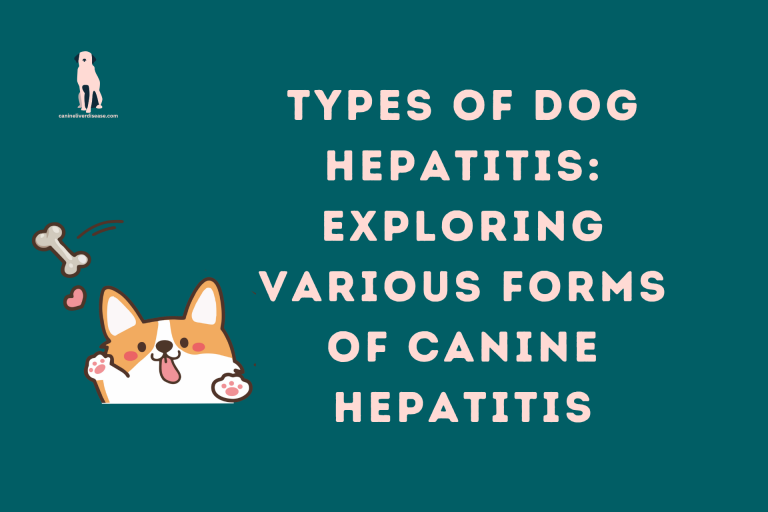What Antibiotics Are Used To Treat Hepatitis In Dogs?
Hepatitis is a concerning health condition that can affect our beloved canine companions. Just like humans, dogs can suffer from hepatitis, and liver inflammation. In this article, we will delve into the world of canine hepatitis and explore the antibiotics used for its treatment. We’ll provide you with essential information in a way that’s easy to understand while maintaining an educational, caring, and urgent tone.
What is Hepatitis in Dogs?
Hepatitis in dogs is a medical condition characterized by inflammation of the liver. It can be caused by various factors, including viral infections, bacterial infections, or even exposure to toxins. Hepatitis can be acute, which means it occurs suddenly and severely, or chronic, where it develops gradually over time.
Types of Hepatitis in Dogs
Several types of hepatitis can affect dogs. These include Canine Infectious Hepatitis (CIH), which is caused by a viral infection, and bacterial hepatitis, which can be caused by various bacteria such as leptospira. It’s essential to identify the specific type of hepatitis your dog is suffering from to determine the most effective treatment.
Antibiotics for Hepatitis Treatment
- Ampicillin
- Amoxicillin
- Cephalexin
- Fluoroquinolones
- Metronidazole
- Oxytetracycline
Common Antibiotics for Hepatitis in Dogs
When it comes to treating hepatitis in dogs, antibiotics play a crucial role in managing the infection. Some commonly used antibiotics for hepatitis treatment in dogs include Ampicillin, Amoxicillin, Cephalexin, and fluoroquinolones. These antibiotics work by targeting and eliminating the bacteria responsible for the infection.
Choosing the Right Antibiotic
Selecting the right antibiotic for hepatitis treatment requires careful consideration. It’s essential to consult a veterinarian who can diagnose the specific type of hepatitis your dog has and prescribe the most appropriate antibiotic. Using the wrong antibiotic can lead to ineffective treatment and potential complications.
Antibiotics and Liver Function
One critical aspect to remember during hepatitis treatment is the impact of antibiotics on liver function. Since hepatitis directly affects the liver, antibiotics must be monitored closely. Antibiotics like Metronidazole and Oxytetracycline may have hepatotoxic effects, potentially causing further liver damage. Therefore, balancing treating the infection and protecting liver health is crucial.
Risks and Considerations
Hepatotoxicity and Antibiotics
Hepatotoxicity refers to the liver’s ability to be damaged by various substances, including medications like antibiotics. In cases of hepatitis, where the liver is already compromised, the risk of hepatotoxicity becomes more significant. It’s essential to be aware of this risk and take precautions when using antibiotics for hepatitis treatment.
Precautions for Hepatitis Treatment
To minimize the risk of liver damage during hepatitis treatment, it’s vital to follow your veterinarian’s instructions carefully. This may include regular liver function tests to monitor your dog’s progress and adjusting the antibiotic dosage as needed. Always communicate any changes in your dog’s condition to your veterinarian promptly.
Antiviral Medications for Hepatitis
The Role of Antiviral Medications
In addition to antibiotics, antiviral medications may be prescribed to treat viral hepatitis in dogs. These medications target the underlying viral infection, helping to reduce its impact on the liver. However, it’s essential to understand the benefits and potential risks associated with antiviral medications, as they may not be suitable for all cases of hepatitis.
Benefits and Risks of Antivirals
Antiviral medications can be beneficial in managing viral hepatitis, but they may also have side effects. Consulting your veterinarian is crucial to assess whether antivirals are necessary for your dog’s specific condition. Your vet can guide the potential benefits and risks, helping you make an informed decision.
The Importance of Veterinary Guidance
Consulting a Veterinarian
When treating hepatitis in dogs, consulting a veterinarian is of utmost importance. Veterinarians are trained to diagnose the type and severity of hepatitis and can recommend the most suitable treatment, whether it involves antibiotics, antivirals, or other supportive therapies. Always seek professional veterinary guidance for your dog’s health.
Monitoring Liver Function
Your veterinarian will closely monitor your dog’s liver function throughout the treatment process. Regular check-ups and liver function tests are essential to ensure that the chosen treatment is effective and not causing further harm to the liver. Your veterinarian will adjust the treatment plan to promote your dog’s recovery.
FAQs
Q1: What is hepatitis in dogs?
A1: Hepatitis in dogs is a medical condition characterized by liver inflammation. Various factors, including viral infections, bacterial infections, or exposure to toxins can cause it.
Q2: What are the common antibiotics used to treat hepatitis in dogs?
A2: Commonly used antibiotics for hepatitis treatment in dogs include Ampicillin, Amoxicillin, Cephalexin, and fluoroquinolones. However, the choice of antibiotic should be determined by a veterinarian based on the specific type and severity of hepatitis.
Q3: Can antibiotics cause liver damage in dogs with hepatitis?
A3: Some antibiotics like Metronidazole and Oxytetracycline may have hepatotoxic effects and can potentially worsen liver damage in dogs with hepatitis. It’s essential to use antibiotics under the guidance of a veterinarian to minimize this risk.
Q4: Are antiviral medications necessary for treating hepatitis in dogs?
A4: Antiviral medications may be necessary for treating viral hepatitis in dogs. However, a veterinarian should determine their use based on the type and severity of the viral infection. Not all cases of hepatitis require antiviral treatment.
Q5: How can I monitor my dog’s liver function during hepatitis treatment?
A5: Your veterinarian will regularly monitor your dog’s liver function through liver function tests. These tests help assess the effectiveness of treatment and ensure that it is not causing further harm to the liver.
Q6: What precautions should I take when treating my dog’s hepatitis with antibiotics?
A6: Follow your veterinarian’s instructions carefully to minimize the risk of liver damage. This may include regular liver function tests, adjusting antibiotic dosages as needed, and promptly reporting changes in your dog’s condition.
Q7: Is hepatitis in dogs a life-threatening condition?
A7: Hepatitis in dogs can range from mild to severe, and the prognosis depends on the type and severity of hepatitis. Some forms of hepatitis can be life-threatening, while others may be manageable with proper treatment and care.
Q8: Can I treat my dog’s hepatitis at home without consulting a veterinarian?
A8: It is not advisable to treat hepatitis in dogs at home without professional veterinary guidance. Consulting a veterinarian is crucial for accurate diagnosis and tailored treatment plans.
Q9: What should I do if my dog shows symptoms of hepatitis?
A9: If your dog displays symptoms such as lethargy, loss of appetite, jaundice, or vomiting, it’s essential to seek immediate veterinary attention. Early diagnosis and treatment can significantly improve your dog’s chances of recovery.
Q10: Can hepatitis in dogs be prevented?
A10: Some forms of hepatitis can be prevented through vaccinations, such as the vaccine for Canine Infectious Hepatitis (CIH). Maintaining good hygiene practices and avoiding exposure to toxins can also reduce the risk of hepatitis in dogs.
Please note that these FAQs provide general information, and it’s crucial to consult with a veterinarian for specific guidance related to your dog’s health and treatment.
Conclusion
In conclusion, hepatitis in dogs is a serious condition that requires prompt and appropriate treatment. Antibiotics, antiviral medications, and supportive care play a vital role in managing this illness. However, working closely with a veterinarian is crucial to determine the right course of action and monitor your dog’s progress. By following professional guidance, you can provide your furry friend with the best possible care and ensure a brighter, healthier future.







